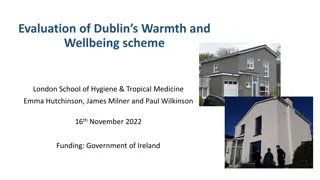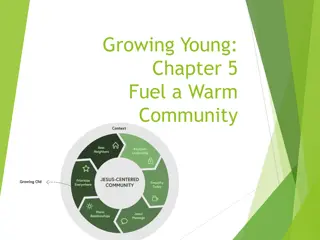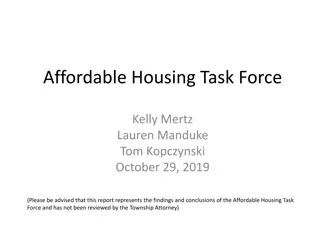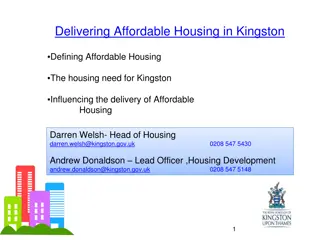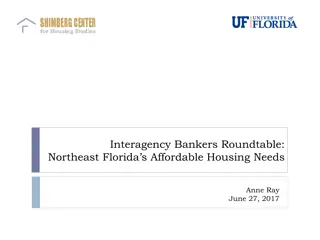Delivering Affordable Warmth: Challenges and Aspirations
Laura Campbell, Energy Adviser, and Lowri Richards, Tenant Engagement & Support, highlight challenges faced in delivering affordable warmth, such as rationing, maintenance costs, and slow smart meter rollout. They aim to improve energy efficiency, upgrade heating systems, and enhance tenant comfort through various initiatives.
Download Presentation

Please find below an Image/Link to download the presentation.
The content on the website is provided AS IS for your information and personal use only. It may not be sold, licensed, or shared on other websites without obtaining consent from the author.If you encounter any issues during the download, it is possible that the publisher has removed the file from their server.
You are allowed to download the files provided on this website for personal or commercial use, subject to the condition that they are used lawfully. All files are the property of their respective owners.
The content on the website is provided AS IS for your information and personal use only. It may not be sold, licensed, or shared on other websites without obtaining consent from the author.
E N D
Presentation Transcript
Challenges, plans and aspirations to deliver affordable warmth Laura Campbell Energy Adviser & Lowri Richards Tenant Engagement & Support energyadvice@lsha.co.uk / Lowri.Richards@Lsha.co.uk
A snapshot of our challenges Rationing/under-heating due to cost. Buying less and paying more: 2020 2023 Average annual cost + 2,500. 7461 KWH 2020 average annual household consumption, reduced to 7224 KWH in 2023 Folks are cold, worried about or have damp and mould Maintenance and repairs can be a challenge with costs and geography 30% use portable heaters very costly
Challenges continued Increase of 40% in reactive maintenance costs and our older properties are increasingly challenging Cost of upgrades doubled Market failure contractor choice NEW Scottish Social Housing Regulations and Government targets (exact terms TBC) BUT no increase in external funding. Skye and Lochalsh Electricity network stretched and constrained Smart Meter Rollout very slow in Highlands & islands No clarity if time of use tariffs will return
Current heating system type LSHA Trying to increase wet-heating systems for whole-house heating using air-source heat pumps but still almost a third are electric storage heaters.
EPCs as a basic measure of energy efficiency: Need to improve Band D/E up to B and Band C improve to Band B by 2045.
Plans and aspirations: Balance of resilience & affordability for landlord and tenants Upgrades to heating systems, especially storage heaters Fabric first: reduce energy demand Draught-proofing and ventilation: components and sensors Improved servicing and maintenance EXAMPLES: Passivhaus standard/full retrofit: Est. 200k per house = 30% saving for tenants Combined ASHP/PV/Battery/insulation: Est. 45k per house = 60% Quantum heaters, PV, insulation: Est. 15k per house = 12% Huge asset management and cost implications. Flooring and soft furnishings Temperature, humidity, moisture management Self-help, knowledge-sharing and advice Continue stock surveys
Plans and aspirations: Balance of resilience & affordability for landlord and tenants continuous monitoring of consumption levels and prioritisation sourcing external grant funding exploring new technologies and partnerships for local provision of renewable energy: communal rather than individual heat pump solutions site generation benefits where feasible such as PV/wind personal or communal battery storage (better tariffs/store cheaper energy) new subsidiary Energy Company ESCOs to deliver alternate solutions new district heating schemes Continue to network, campaign, advocate, share good practice Finding better ways to heat common entrance flats New builds incorporate zone control design, installation standards (windows/doors) which are common failures. Ensure best heating and ventilation for air quality management. Skills development: internal up-skilling/qualifications and access to contractors
Our strategy Devising a programme to deliver the best financial, technical and support solutions that meet these energy and warmth challenges. Meet these challenges by delivering resilient green social housing which best delivers whole house heating and affordable warmth whilst minimising fuel poverty. Landlord affordability/Tenant Affordability/Regulatory Compliance/Zero Carbon/Fuel Poverty These are five different things with non complementary goals and LSHA will need to compromise...






